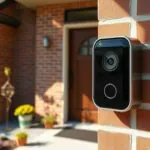Table of Contents
ToggleIn a world where your toaster can chat with your fridge, smart home innovations have taken convenience to a whole new level. Imagine waking up to the aroma of freshly brewed coffee while your lights gently mimic a sunrise. It’s not science fiction; it’s just your home being a little too smart for its own good.
Overview of Smart Home Innovations
Smart home innovations encompass a wide range of technologies designed to improve efficiency and convenience. Home automation systems allow users to control lighting, heating, and security from their smartphones. Various devices communicate across networks, enabling remote management and monitoring.
Smart speakers serve as hubs for controlling compatible devices. They support voice commands for tasks such as adjusting the thermostat or playing music. Smart thermostats learn user preferences over time, optimizing energy usage for better savings.
Smart appliances, such as refrigerators and ovens, include features that facilitate meal planning and grocery shopping. These devices notify users when supplies run low, making it easier to manage household necessities. Smart lighting offers flexibility with customizable colors and brightness, creating different atmospheres for various occasions.
Security innovations incorporate cameras, motion sensors, and smart locks. These enhance home security by providing real-time alerts and remote access control. Smart doorbells, equipped with cameras, enhance safety by allowing homeowners to see visitors instantly.
Energy management technologies optimize power consumption. Smart plugs and energy monitors help track energy usage, contributing to sustainability. Homes equipped with solar panels benefit from smart inverters that monitor energy production and consumption.
Overall, smart home innovations create integrated experiences that elevate daily living. They blend comfort and efficiency, leading to a connected lifestyle that adapts to personal needs and preferences. Each advancement brings significant improvements, ensuring that modern homes become increasingly intuitive and easy to manage.
Key Technologies Driving Smart Homes

Smart home technologies rely on several key innovations. Understanding these technologies enhances the overall smart home experience.
Internet of Things (IoT)
IoT serves as the backbone of smart home devices. This network connects various appliances, enabling seamless communication between them. Devices like smart thermostats and security cameras gather and share data, enhancing efficiency. Homeowners can remotely control these devices using mobile apps. Each connected gadget contributes to creating a unified smart home ecosystem, improving convenience. Real-time data sharing facilitates better energy management by allowing users to monitor consumption patterns. Sensors also adjust settings automatically based on user behavior. With IoT, homes become more adaptive, responding to individual preferences and routines.
Artificial Intelligence (AI)
AI transforms smart home management by learning user habits. Systems analyze data from various devices, making personalized recommendations. Smart assistants, such as Amazon Alexa and Google Assistant, utilize voice commands to streamline operations. Actions like adjusting temperature or turning on lights happen intuitively. Homes equipped with AI learn to adapt to schedules, optimizing energy efficiency. Predictive algorithms also assist in creating routines tailored to specific lifestyles. Enhanced security measures arise through AI, with smart cameras capable of identifying unusual activity. These innovations foster a proactive and responsive living environment.
Popular Smart Home Devices
Smart home devices revolutionize daily living by providing convenience, security, and efficiency. Various innovations lead the market, enhancing user experiences across different functions.
Smart Thermostats
Smart thermostats optimize heating and cooling in homes. These devices learn user habits, enabling personalized temperature settings. The Nest Learning Thermostat, for instance, adapts to preferences over time, which can result in energy savings of up to 15% on heating and cooling bills. Users control these devices remotely via smartphones, allowing adjustments from anywhere. Features like scheduling and automation enhance comfort while minimizing energy waste. According to EnergyStar, using smart thermostats can significantly lower household energy consumption. Many models integrate with other smart devices, creating a cohesive automation system throughout the home.
Smart Security Systems
Smart security systems enhance home safety through advanced technology. Devices like Ring doorbells and Arlo security cameras provide real-time surveillance and alerts. Homeowners monitor entries remotely, ensuring peace of mind while away. Smart locks, such as August Smart Lock, offer keyless entry options and remote access management. These systems often integrate with mobile apps, simplifying control over security settings. Data from the FBI indicates that homes equipped with security systems are 300% less likely to experience a break-in. Innovations in AI enable these systems to distinguish between familiar faces and strangers, enhancing overall security and response capabilities.
Benefits of Smart Home Innovations
Smart home innovations provide numerous advantages that enhance daily living. These technologies simplify routines and contribute significantly to energy conservation.
Convenience and Automation
Smart home systems revolutionize convenience through automation. Homeowners control devices like lights and thermostats from smartphones, eliminating the need for manual adjustments. Voice-activated smart speakers manage tasks and integrate various devices into a single platform. For instance, users can set routines that adjust lighting and temperature during wake-up time. Moreover, smart appliances streamline household chores; they can automatically reorder groceries when supplies run low, saving time and promoting efficiency. Overall, the convenience of automation enhances lifestyle, reducing the stress of daily tasks.
Energy Efficiency
Energy efficiency improves significantly with smart home innovations. Smart thermostats automatically adapt to user habits, optimizing energy consumption and potentially lowering bills by 15%. Homeowners monitor energy usage through smart plugs and energy monitors, making real-time adjustments that promote sustainability. Smart lighting systems, equipped with motion sensors, activate only when needed, further conserving energy. This combination of technologies helps create a more sustainable living environment, benefitting both the user and the planet. In essence, smart home innovations contribute to a decrease in energy waste, aligning with modern environmental goals.
Challenges and Concerns
Smart home innovations bring significant advancements but also introduce challenges. Understanding these concerns helps homeowners make informed decisions.
Security Risks
Security risks pose a major concern with smart home devices. Many IoT devices can become targets for cyberattacks. Hackers exploit vulnerabilities in unprotected networks, potentially gaining access to personal information. In fact, research from the Federal Trade Commission indicates that 70% of smart home devices are susceptible to such threats. Smart cameras and locks, while enhancing security, might also inadvertently expose sensitive data if not properly secured. Ensuring strong passwords and regular updates protects devices from unauthorized access.
Privacy Issues
Privacy issues often emerge alongside smart home technologies. Data collection practices raise questions about how personal information is utilized. Users frequently share data with third-party companies for services, leading to concerns about surveillance and data misuse. According to a recent study, approximately 80% of smart device users express worries about their data privacy. This uncertainty often discourages individuals from fully embracing smart technology. Choosing devices with transparent data policies minimizes privacy risks, ensuring that homeowners feel secure in their tech-enabled environments.
Smart home innovations are reshaping the way people live by enhancing convenience and efficiency. The integration of IoT and AI technologies creates a more responsive and secure living environment that adapts to individual needs. With devices that streamline daily tasks and promote energy conservation, homeowners can enjoy a seamless blend of comfort and technology.
While challenges like security and privacy concerns exist, choosing the right devices can mitigate these risks. As smart home technology continues to evolve, it promises to make everyday life not just easier but also more sustainable. Embracing these advancements allows individuals to live in homes that truly reflect their lifestyles and values.





